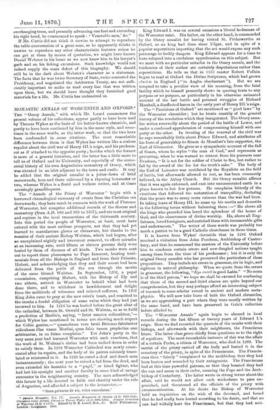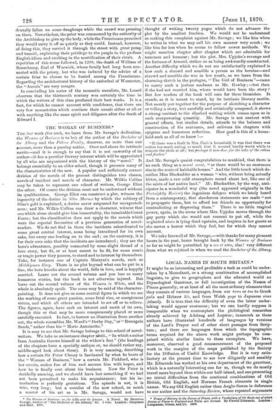MONASTIC ANNALS OF WORCESTER AND OXFORD.• THE " Osney Annals,"
with which Mr. Luard commences the present volume of his collections, appear partly to have been used by Thomas 1Vykes as the basis of his better-known chronicle, and partly to have been continued by him in the same style, and some- times iu the same words, as the latter work, so that the two have been confounded in .some citations. The most remarkable difference between them is that 1Vykes has written like a zealous
royalist about the civil war of Henry reign, and his predeces- sor as if attached to the opposite party.; besides which the former is more of a general historian, and the latter has a little more to tell us of Oxford and its University, and especially of the econo- mical history of his own Augustinian monastery of Osney, which was situated in an islet adjacent to the town and castle. It may be added that the original annalist is a jotter-down of brief memoranda, here and there enlivened by a rhyming hexameter or two, whereas Wykes is a florid and verbose writer, and at times amusingly grandiloquent.
The " Annals of the Priory of Worcester " begin with a borrowed chronological summary of events from the Christian era downwards; they have much in common with the work of Florence of Worcester, but comprise additional records of the diocese and monastery (from A.D. 680 and 969 to 1307), and are most original and copious in the local transactions of the thirteenth century. Into this period the people of Worcester, at least, must have entered with the most sublime prospects, not that they had yet learned to manufacture gloves or chinaware, but thanks to the remains of their ancient Bishop 1Vulstan, which had begun, after an unexplained nightly and irreverent removal, to effect miracles at an increasing rate, until fifteen or sixteen persons daily were healed by them of diseases of all kinds. Two monks were sent out to report these phenotnena to Pope Innocent, bearing testi- monials from all the Bishops in England and from their Primate, Hubert, and acknowledging that they and their escort had been delivered from the perils of the sea through the merits of the same blessed Wulstan. In September, 1202, a papal commission, comprising Hubert, with the Bishop of Ely and two abbots, arrived in Worcester to behold what had been done there, and to withdraw in bewilderment and delight from the multitude of witnesses and relieved sufferers. In 1207 King John came to pray at the new saint's tomb, and remitted to the monks a feudal obligation of some value which they had just incurred to him. In 1216 he was buried before the great altar of the cathedral, between St. Oswald and St. Wulstan, so as to fulfil a prediction of Merlin's, saying, " Inter sauctos collocabitur,"— which Wykes has mentioned in terms not showing much respect for Celtic genius,—" quamobrem vere bruti Britones fabulantur ridiculosas illas vanes Merlini, quas falai) tamen prophetias ease arbitrantur, in eo fuisse completes." Yet John's party in the very same year had harassed Worcester with such exactions, that the work of St. Wulatan's shrine had been melted down in order to satisfy them. In 1218 Worcester Cathedral was newly conse- crated after its repairs, and the body of its patron solemnly trans- lated or reinterred in it. In 1220 he cured a deaf and dumb man instantaneously ; the next year he raised a lad from the dead, and even extended his bounties to a " pugil," or hired fighter, who had lost his eyesight and another faculty in some kind of savage encounter in the neighbouring country. The man acknowledged this favour by a life devoted to faith and chastity under the rule of Augustine, and afforded a subject to the hexameter,—
" Sean privates fit vir, vidot exoculatus."
• Amato Monagisci, Vol. IV. Annake Monaskrii Sc Oseneia (A.D. 1016-1347). Chronkon eulgo dictum. Chronkon Thonue Wykes (A.0.1066-1289). Annaks Prioralus de Wigornia (Al). 1-1377). Edited by H. H. Luard, de. Bolls' Publications. London : Longman. 1869.
King Edward I. was on several occasions a liberal bedesman of the Worcester saint. His father, on the other hand, is commended by the Osney annalist for having visited St. Frideswertha at
Oxford, as no king had done since Edgar, and in spite of a popular superstition importing that the act would expose any such personage to bodily dangers. King Edward appears for a time to have relapsed into a credulous apprehension on this subject. But we meet with no particular miracles in the Osney annals, and the tendencies of their author are certainly disputatious rather than superstitious. He tells us that in 1133 master Robert Pullein began to read at Oxford the Divine Scriptures, which had grown obsolete in England (" in Anglia obsoluerant "). But we are tempted to take a peculiar view of his meaning, from the fatal facility which he himself presently shows in quoting texts to any purpose or no purpose, as particularly in his otherwise animated account of the last battle and personal struggles of Richard Marshall, a disaffected baron in the early part of Henry M.'s reign.
The " Provisions of Oxford" are mentioned as " good laws " by the Worcester chronicler ; but he treats scantily of the general history of the revolution which they inaugurated. The Osney anna- list writes reservedly about the period of the battle of Lewes, and under a confessed apprehension of compromising himself with one party or the other. In treating of the renewal of the civil war he says remarkably little about Prince Edward, and attributes all his feats of generalship to Simon de Montfort's late supporter, the Earl of Gloucester. Ile gives us a sympathetic account of the fall of Simon, whom he styles " the man of God," and represents as protesting, when he was warned to retreat from his pursuers near Evesham, " It is not for the soldier of Christ to flee, but rather to fall by the sword of the foe for the truth's sake." The body of the Earl of Leicester was mutilated by the Royalists on the field of battle, but afterwards allowed to rest, as has been commonly believed, in the Abbey Church. But the Osney annalist affirms that it was again exhumed, and cast into unconsecrated earth in a place known to but few persona. He complains bitterly of the exactions that followed the restoration of tranquillity, declaring that the peace was to many more ruinous than the war had been. In taking leave of Henry III. he sums up his merits and demerits in the following terms without balancing them :—" He above all the kings who preceded him loved the splendour of the house of God, and the observances of divine worship. He, above all Eng- lishmen, loved foreigners, and enriched them with innumerable gifts and endowments." The writer of these words was probably too much a patriot to be a good Catholic churchman in those times.
It is known from 1Vykes' chronicle that in 1284 Oxford received a visitation from John Peccham, Archbishop of Canter- bury, and that he summoned the masters of the University before him to condemn certain errors and new-fangled notions taught among them from the time of his predecessor ; but it is only the original Osney annalist who has preserved the particulars of these propositions. They include six errors in grammar, six in logic, and eighteen in natural philosophy. When we quote from the errors in grammar, the following, "Ego currit is good Latin." "No noun is of the third person," we hope we shall be excused for confessing that those of the second and third classes are quite beyond our comprehension, but they may perhaps afford an interesting subject of research to some scholar versed in ancient and modern meta- physics. We will now take leave of both the Oxford chronicles, as we are approaching a part where they were mostly written by the same hand, and have been preserved in Gale's collection before alluded to.
The "Worcester Annals" again begin to abound in local records during the last fifteen or twenty years of Edward L's reign. Here we find recorded the quarrels of the monks with their bishops, and afterwards with their neighbours, the Franciscan friars. The latter class prose chiefly from questions as to the right of sepulture. The most remarkable instance of this was the affair of a certain Poche, a citizen of Worcester, who died in 1289. The sacrist of the priory carried off the body and buried it in the cemetery of the priory, iu spite of the Franciscans. The Francis- cans then " falsely " complained to the archbishop that they had been beaten and wounded by their antagonists. The Franciscans had at this time powerful patrons, so that they boasted they had the sun and moon in their order, meaning the Pope and the Arch- bishop of Canterbury. The latter wrote in strong terms about the affair, said he would not allow such wickedness to pass un- punished, and threatened all the officials of the priory with excommunication. At his desire the Bishop of Worcester held an inquisition on the wish of the deceased, and found that he had really been buried according to his desire, and that no one had wilfully hurt the Franciscans, but that they had acci- dentally fallen on some dungheaps while the crowd was pressing on them. Nevertheless, the prior was summoned by the authority of the Archbishop to give up the body, while the Franciscans promised they would carry it off as quietly as they could. Instead, however, of doing this, they carried it through the street with great pomp and tumult, explaining their privilege to the people in the profane English idiom and exulting in the mortification of their rivals. A repetition of this scene followed, in 1298, the death of William of Beauchamp, Earl of Warwick, whose family had long been con- nected with the priory, but who was induced by the advice of a certain friar to choose to be buried among the Franciscans. Regarding the architectural history of the cathedral of Worcester, the "Annals" are very meagre.
In concluding his series of the monastic annalists, Mr. Luard observes that the thirteenth century was certainly the time in which the writers of this class produced their best works. It is a fact, for which he cannot account with confidence, that there are very few monasteries which continue their annals either at all or with anything like the same spirit and diligence after the death of Edward I.































 Previous page
Previous page